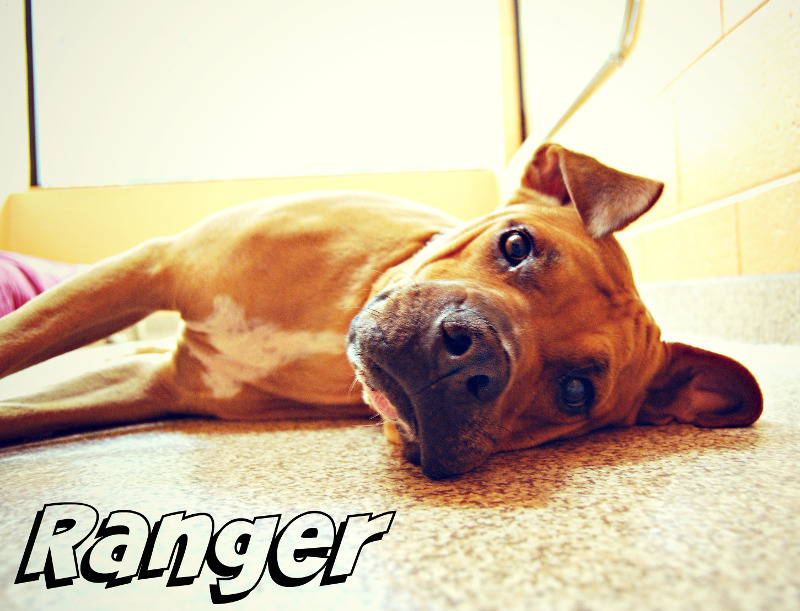Contributed by Cherese Cobb
In the fall of 2015, Paulding County Animal Control picked up Ranger, a two- or three-year-old boxer-bully mix, who was living in a Walmart parking lot “When he arrived at Mostly Mutts (MM), he was literally skin and bones with almost no hair,” says Emily Shervin, owner of The Gratefull Dog and the coordinator of Mostly Mutts University (MMU). The staff wasn’t sure that he’d survive. Ranger pulled through, though, and the missing half of his coat slowly grew in. He also packed on weight, eventually tipping the scales at almost 80 pounds. 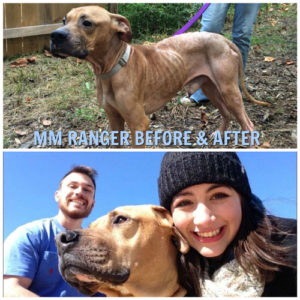
“When you have that kind of big, scary looking dog, it’s difficult,” she said. “When a dog is labeled, it doesn’t necessarily reflect his true personality.” Ranger was a gentle, quiet couch potato with a skin allergy and fear of thunderstorms. Slightly silly, his favorite pastimes were greeting and cuddling with staffers on the floor. More than 200 days ticked by, and no one adopted him.
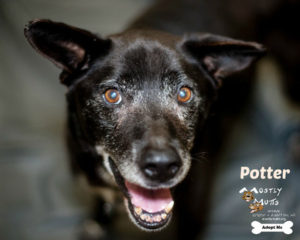
That’s when Shervin started training him in everyday basic commands like “sit,” “stay,” “down,” “come,” “leave it,” “drop,” and “place.” Ranger was a sponge and eager to learn, especially for “cheese.” On a Sunday volunteer hike through at Kennesaw Mountain—13 days shy of his first year anniversary—a couple spotted him and fell in love, opening their hearts and home to MM’s first fully-trained dog.
“Eighty-six percent of dogs are in shelters because of behavioral issues,” she said. “Ranger is kind of the reason MMU started on May 1 (of this year) [after receiving a grant from Maddie’s Fund],” says Shervin, who had worked with marine mammals in open ocean settings before dogs. “We saw the benefit of working with a dog was that it could be adopted.”
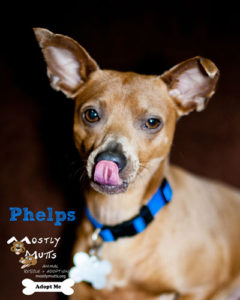
In less than six months, more than 100 graduates from the program have been adopted. Fourteen volunteer trainers work with two to three dogs each. “What the requirement is, and I’m really tough about it, volunteers have to come in three to four times per week to train the dogs,” she said. “Consistency is important in training.” When you walk through the shelter, whether you’re seeing the oldest dog, 10-year-old Marshall, or the youngest, four-month-old Paul, you’ll see an orange or green chart titled, “I know…” with a checked list of skills like “accepts strangers” and “walks in and out of doors calmly.”
There are also check boxes for kid-friendliness, cat-friendliness—volunteers test dogs with Maz, MM’s laid-back cat mascot—and dog-friendliness. “Whenever there’s a dog issue, it’s usually female and female or male and male,” she said. “There are also size issues. The little dogs have Napoleon complexes. They tend to be a little more apprehensive of bigger dogs.”
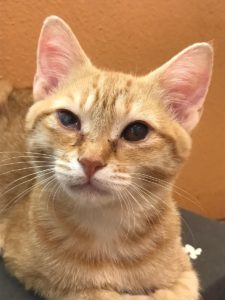
“The number one problem of misbehaved dogs is that they’re not being exercised enough,” Shervin said. “Our volunteers are amazing. They’ll walk the dogs all over Kennesaw for us. I think that’s just a huge part of success for some of these dogs.”
Pairing rigorous exercise with 100% positive reinforcement and treat training, the staff has been able to help MMU graduates be less aggressive towards other dogs. “When Potter came in, he was actually attacking his own reflection,” she said. The 10-year-old senior, who had lived on a chain his whole life, was recently adopted by a little girl’s family through the Mostly Mutts Read to Dogs Program. Anytime Christopher, a one-year-old Jack Russell terrier – beagle mix, would spot another dog, he’d turn and try to bite his leash or his trainer’s leg. With marathon-level exercise, his displaced aggression melted away. He started playing nicely with other dogs a month ago and was recently adopted.
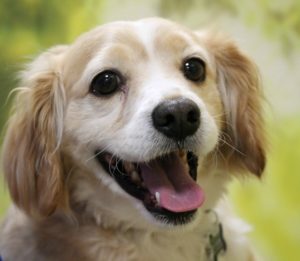
To learn more about MMU or adopt your own MMU graduate, visit mostlymutts.org

